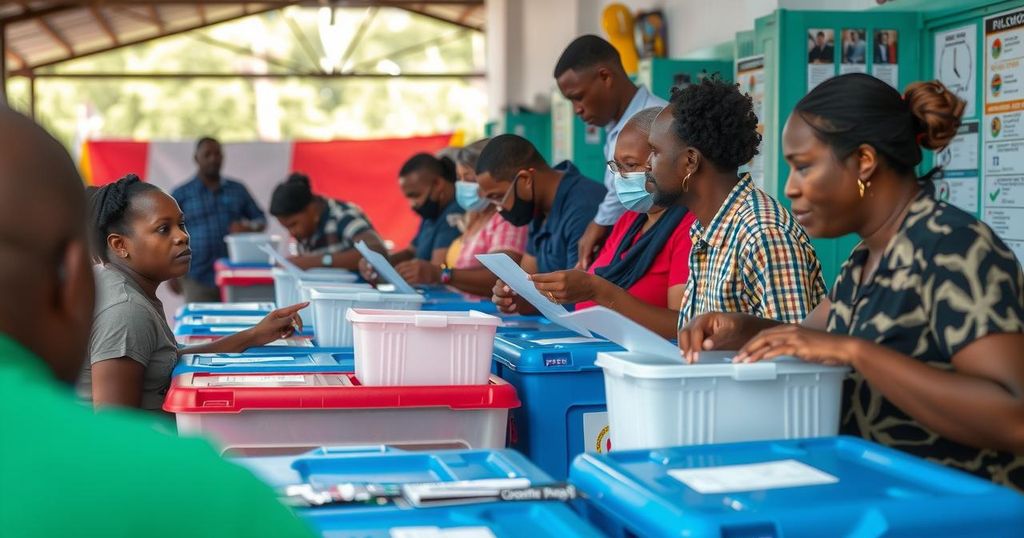World news
ABDALLAH SAMBI, AFRICA, AUSTRALIAN ASSOCIATED PRESS, AZALI ASSOUMANI, COMOROS, ELECTION FRAUD, GOVERNANCE, GOVERNMENT, HAMIDOU KARIHILA, HOPE OF THE COMOROS, INDIAN OCEAN, INDIAN OCEAN ARCHIPELAGO, JUWA, NO, NOUR EL - FATH, OPPOSITION, POLITICS, PRESIDENTIAL ELECTION, REUTERS, SUPREME COURT
Oliver Grayson
0 Comments
Comoros Voters Head to Polls Amid Controversy Over Elections
Voters in Comoros are casting ballots for a new 33-seat parliament amidst allegations of electoral irregularities following President Azali Assoumani’s contentious re-election. Approximately 338,000 are registered to participate, with notable opposition voices advocating for electoral boycotts while others emphasize participation as a means to expose flaws in Assoumani’s regime. Results from the elections are expected by the end of the week.
Citizens in Comoros are participating in parliamentary elections to fill the 33 seats of their legislature, nearly a year following President Azali Assoumani’s controversial re-election, which opposition groups claim was marred by significant irregularities. Despite these claims, representatives of the ruling party vehemently refute such allegations. Polling commenced early on a Sunday morning, with approximately 338,000 registered voters. This marks the first parliamentary election since January 2020, with nearly 100 candidates sanctioned by the Supreme Court to vie for election positions.
Opponents of President Assoumani accuse him of authoritarian practices and express concern over his apparent intentions to position his eldest son, Nour El-Fath, as his successor upon the conclusion of his term in 2029. Assoumani has been at the helm of Comoros since ascending to power via a coup in 1999, triumphing in three subsequent elections. In 2024, he assigned his son considerable authority, establishing him as the chief coordinator of government operations.
Some opposition factions, such as the Juwa party, led by former President Ahmed Abdallah Sambi—currently serving a life sentence—have advocated for a boycott of the elections; however, others have dismissed this call. Hamidou Karihila, representing the opposition Hope of the Comoros party, remarked, “The Azali regime is weakened … by participating in these elections we are contributing to further exposing the flaws in its system and accelerating its inevitable fall.” Results from this election are anticipated by Friday.
The Democratic Republic of the Comoros is an archipelago located in the Indian Ocean, which has experienced significant political turmoil since its independence. President Azali Assoumani, who took power in a military coup in 1999, has faced accusations of heavy-handed governance. The nation had not held parliamentary elections since January 2020, and this election is critical for various parties, particularly those in opposition to Assoumani’s rule, who are concerned about the perceived extension of authoritarianism and the political legacy planned for his son. Opposing parties have varied in their strategies, with some calling for election participation as a means of exposing governmental deficiencies while others propose boycotts to challenge legitimacy.
The upcoming parliamentary elections in Comoros reflect a volatile political landscape characterized by division between the ruling party and opposition factions. President Assoumani’s tenure, marked by accusations of authoritarianism and concerns over dynastic succession, plays a pivotal role in shaping public discourse around the elections. With a significant number of candidates vying for election and calls for both participation and boycott from various political factions, the outcome of this election will undoubtedly impact the future political trajectory of Comoros.
Original Source: www.canberratimes.com.au




Post Comment